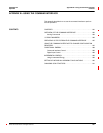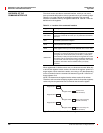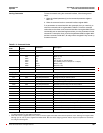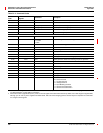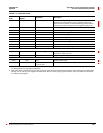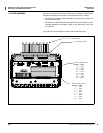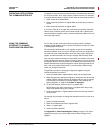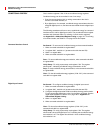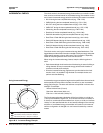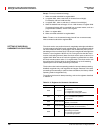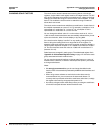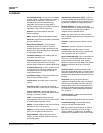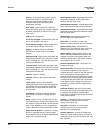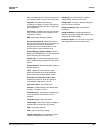
63230-300-212 Appendix B—Using the Command Interface
April 2001 Incremental Energy
189
© 2001 Schneider Electric All Rights Reserved
The circuit monitor’s incremental energy feature allows you to define a start
time, end time, and time interval for incremental energy accumulation. At the
end of each incremental energy period, the following information is available:
• Wh IN during the last completed interval (reg. 1748–1750)
• VARh IN during the last completed interval (reg. 1751–1753)
• Wh OUT during the last completed interval (reg. 1754–1756)
• VARh OUT during the last completed interval (reg. 1757–1759)
• VAh during the last completed interval (reg. 1760–1762)
• Date/time of the last completed interval (reg. 1763–1766)
• Peak kW demand during the last completed interval (reg. 1940)
• Date/Time of Peak kW during the last interval (reg. 1941–1944)
• Peak kVAR demand during the last completed interval (reg. 1945)
• Date/Time of Peak kVAR during the last interval (reg. 1946–1949)
• Peak kVA demand during the last completed interval (reg. 1950)
• Date/Time of Peak kVA during the last interval (reg. 1951–1954)
The circuit monitor can log the incremental energy data listed above. This
logged data provides all the information needed to analyze energy and power
usage against present or future utility rates. The information is especially
useful for comparing different time-of-use rate structures.
When using the incremental energy feature, keep the following points in
mind:
• Peak demands help minimize the size of the data log in cases of sliding or
rolling demand. Shorter incremental energy periods make it easier to
reconstruct a load profile analysis.
• Since the incremental energy registers are synchronized to the circuit
monitor clock, it is possible to log this data from multiple circuits and
perform accurate totalizing.
Incremental energy accumulation begins at the specified start time and ends
at the specified end time. When the start time arrives, a new incremental
energy period begins. The start and end time are specified in minutes from
midnight. For example:
Interval: 420 minutes (7 hours)
Start time: 480 minutes (8:00 a.m.)
End time = 1440 minutes (12:00 p.m.)
The first incremental energy calculation will be from 8:00 a.m. to 3:00 p.m.
(7 hours) as illustrated in Figure B–3. The next interval will be from 3:00 p.m.
to 10:00 p.m., and the third interval will be from 10 p.m. to 12:00 p.m. because
12:00 p.m. is the specified end time. A new interval will begin on the next day
at 8:00 a.m. Incremental energy accumulation will continue in this manner
until the configuration is changed or a new interval is started by a remote
master.
INCREMENTAL ENERGY
Using Incremental Energy
6
12
93
2
1
10
11
5
4
7
8
Start Time
End Time
1
s
t
I
n
t
e
r
v
a
l
2
n
d
I
n
t
e
r
v
a
l
3
r
d
I
n
t
e
r
v
a
l
1st Interval (7 hours) = 8:00 a.m. to 3:00 p.m
2nd Interval (7 hours) = 3:00 p.m. to 10:00 p.m
3rd Interval (2 hours) = 10:00 p.m. to 12:00 p.m
Figure B–3: Increment Energy Example



